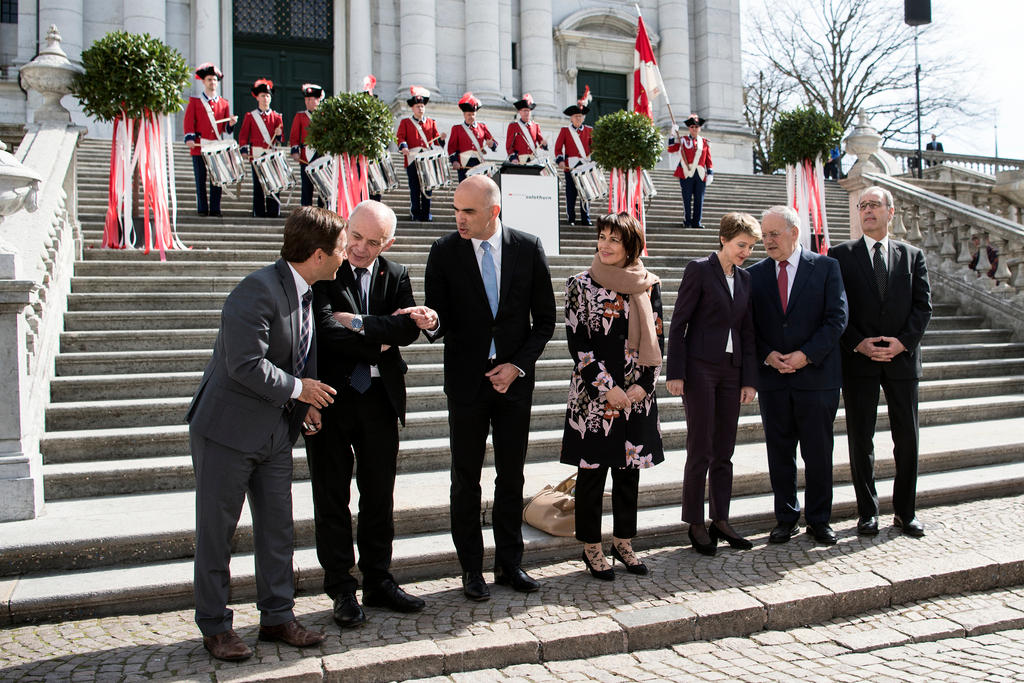
‘Helvetia is calling!’ Is she being heard?

On December 5, the Swiss parliament will elect two new ministers to succeed Johann Schneider-Ammann and Doris Leuthard, both stepping down at the end of the year. The big question: how many women will be elected to the new Federal Council?
Each Federal Council election in Switzerland over the past few years has had its peculiarities.
In 2015, when Guy Parmelin was elected, the focus was on the Swiss People’s Party regaining two seats in the executive body. In 2017, it was all about getting a minority Italian speaker back into government – Ignazio Cassis was chosen.
And this year, it’s all about female representation. How many women will be elected into the new Federal Council? One, two, or even three?
What can we expect?
Currently there are two female members in the cabinet. This puts Switzerland in 33rd place out of the 185 countries listed in the United Nation’s international ranking of women’s representation.
If the number of female federal councillors were reduced to one, Switzerland would drop to 115th in the world; with three women in parliament, however, it would immediately leap into the top ten.
The politically independent movement “Helvetia is calling!” advocates for a greater female representation in the Federal Council. It is funded by Alliance F, a well-established women’s equality organisation, and Operation Libero, a prominent progressive association.
Their main argument centres around the different worlds in which men and women live. Women, they argue, view political issues from another perspective due to their social and economic experiences; this can broaden the collective view of government.
Conservative women have a different point of view. “It would be ‘gender madness’ to only put forward female candidates”, says Natalie Ricki, the Swiss People’s Party candidate for Zurich’s cantonal government.
What have we seen in the past?
Looking at the historic allocation of women’s seats in the government, a large difference appears between left-wing and right-wing parties:
- The Swiss People’s Party (right) has never put forward a female candidate.
- The Radical Party (centre-right) has put forward one female federal councillor.
- The Christian Democratic Party (centre) has had two.
- The Social Democrats (left) has placed three women in the Federal Council.
Political scientists suggest two main reasons for the difficulties women face in getting into positions of political power.
One is the type of voting system used. The proportion of women in the House of Representatives stands at 32%; in the cantonal parliaments, the average is 28%. Both these bodies use mainly a proportional representation (PR) system to select members.
In the cantonal governments, however, most of which use a majority voting system, the share of female parliamentarians stands at 21%. The situation is even worse in the Senate, the second chamber of the Swiss Parliament. Only 15% of its members are women.
The other reason is the zeitgeist. Though women benefitted from a more liberal Swiss society after 1971, when they gained the right to vote in federal elections, a backlash has been ongoing since 2003, when women began to slowly disappear from the Senate. In 2015, this trend also spread to the cantonal governments.

Radicals and Christian Democrats
With a view to the national elections next year, “Helvetia is Calling!” has increased its public pressure specifically targeting the Radical-Liberals (of which Schneider-Ammann is part) and the Christian Democrats (Leuthard’s party). If both groups elect a woman to the Federal Council in December, they will be able to raise their profiles in the 2019 votes, the argument goes.
The Radical-Liberals are under much more pressure, a fact which has not gone unnoticed by the women’s subgroup within the party. The group has not put forward a female federal councillor for 29 years. Karin Keller-Sutter, however, the president of the St Gallen Senate, looks a promising candidate for the open seat.
The Christian Democrats can be more relaxed. In the past 12 years, their representation in the Federal Council has been exclusively female. Initially, the women’s league of the Christian Democrats was keen on having two female candidates; however, the word of the party president – he has said that “at least one woman” would be put forward.
Status quo or no?
I personally think that two female federal councillors will be the most likely outcome. This would maintain the status quo, although the women’s representation would shift from the Christian Democrats to the Radicals. If this is the case, the demands of “Helvetia is Calling!” would be partially heard, partially ignored.
What would this mean for women’s representation in general?
In Switzerland, it’s the parliament that elects the government, not the people. There are currently 69 women in the House of Representatives and Senate combined. That works out as 28% of all deputies; the exact same percentage as two seats in a seven-member cabinet.
Political parties in Switzerland
People’s Party (right-wing)
Social Democratic Party (left-wing)
Radical-Liberal Party (centre-right)
Christian Democratic Party (centrist)
Green Party (lefwing)
Liberal Green Party (centrist)
Conservative Democratic Party (centrist)
Translated from German by Billi Bierling, swissinfo.ch

In compliance with the JTI standards
More: SWI swissinfo.ch certified by the Journalism Trust Initiative


























You can find an overview of ongoing debates with our journalists here . Please join us!
If you want to start a conversation about a topic raised in this article or want to report factual errors, email us at english@swissinfo.ch.